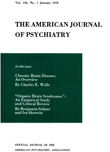Psychotherapy and Pharmacotherapy in Chronic Schizophrenia
Abstract
The relative merits of psychotherapy alone and psychotherapy in conjunction with phenothiazine therapy were investigated in the treatment of 20 chronic schizophrenic patients. Psychotherapy alone produced no demonstrable change over a two-year period in the nondrug group. The combination of drug and psychotherapy reduced florid symptomatology and seemed, for some patients, to promote sensitivity in responding to loss and to make the patients more receptive to communication with therapists and others. The authors conclude that phenothiazine therapy is one of the most useful tools now available in the treatment of chronic schizophrenia.
Access content
To read the fulltext, please use one of the options below to sign in or purchase access.- Personal login
- Institutional Login
- Sign in via OpenAthens
- Register for access
-
Please login/register if you wish to pair your device and check access availability.
Not a subscriber?
PsychiatryOnline subscription options offer access to the DSM-5 library, books, journals, CME, and patient resources. This all-in-one virtual library provides psychiatrists and mental health professionals with key resources for diagnosis, treatment, research, and professional development.
Need more help? PsychiatryOnline Customer Service may be reached by emailing [email protected] or by calling 800-368-5777 (in the U.S.) or 703-907-7322 (outside the U.S.).



